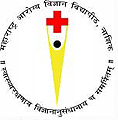Contact Information
-
location_on
Vani Road, Mhasrul, Nasik, Maharashtra 422004, India
-
call
(0253) 2539100, 2539300, 6659100, 6659300
-
mail_outline
(0253) 2539295, 6659295
-
email
- web_asset
Approved By: UGC
M.D. (Pulmonary and Critical Care Medicine)
|
Duration: 2 Years |
Eligibility: Post Graduation |
Course Syllabus
Basic Sciences
- Anatomy of The Lung & Development & Genetics of Lung Diseases.
- Physiology
- Respiratory Mechanics
- Physiology of Respiration & Ventilation.
- Physiological basis of pulmonary function testing & arterial blood gases. Acid based disturbances
- Physiology aspects related to mechanical ventilation
- Physiology related to endocrine aspects of lung
- Sleep physiology
- Patho-physiology of all disorders pertaining to pulmonary medicine.
- Public Health & Epidemiology:
- Epidemiological aspects of major respiratory and public health problems like tuberculosis, asthma, interstitial lung disease & occupational & environmental disorders.
- Pulmonary Rehabilation
- Surgical Aspects;
- Surgical interventions in various pulmonary disorders including trauma, infections & lung transplantation & minimally invasive interventions.
- Medico-Legal Aspects:
- Principles of care for patient requiring mechanical ventilation. Long term oxygen therapy
- Compensation (occupational lung disorders) Fitness & disability evaluation.
- Personal Protective measures for occupational health, biosafety guidelines for medical equipment & waste disposal.
- Human Rights, ethical aspects, consent for procedures/newer drug development. Aspects related to medical procedures & interventions performed in various pulmonary disorders.
- Recent Advances :
- Drug development in respiratory medicine. Sleep Medicine
- Invasive diagnostic techniques
- Lung in extreme conditions.
- Infections :
- Tuberculosis (pulmonary & extrapulmonary)
- Opportunistic infections related to immunocompromised state & other infections in immunocompetent individuals.
- Infections related to systemic illnesses
- Environmental Medicine Related To Pulmonary Medicine With Special Reference To Air Pollution & Occupational Diseases.
- Pulmonary Critical Care Aspects :
- Conventional Chest Radiology & Lung Imaging
- Pulmonary Circulatory Disorders.
- Diseases Of Airways
- Neoplastic Diseases
- Diseases Of Mediastinum
- Interstitial Lung Disease
- Pulmonary Infections
- Problem Based Learning For Theory & Practical On Each Aspect (Reference : W.H.O.) :
- Cause of the complaint
- Ways to differentiate between possible causes
- Pathophysiological mechanisms responsible for the complaint and clinical conditions.
- Best possible management strategies.
- Prevention of recurrence.
- In addition to the above-cited syllabus a student should acquire theoretical knowledge, dissertation, clinical and communication skills as well as training in research methodology.

